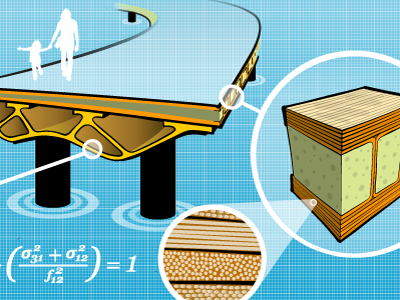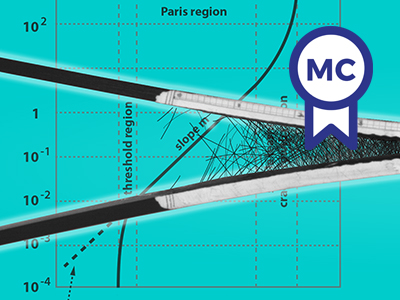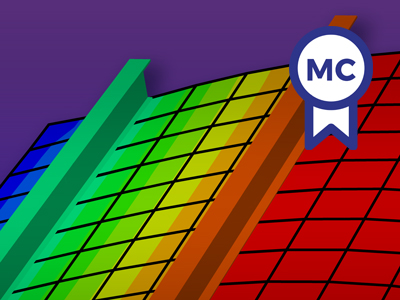Overview
A need to know for anyone wanting to be engaged into lightweight design of structures. When - Who - Where - Why - How - What.
Weight reduction is a key factor in the development of materials and components for use in many industries. Lightweight structures are widely used for this purpose. However, these structures present challenges: they need to be light but also safe, durable and easy to maintain. How can this be done?
This course provides an introduction to lightweight structures, starting with the "trinity" - the interaction between shape design, base material and manufacturing. The evidence gained from both successes and failures demonstrates that the interaction between these three elements is crucial for successful designs and end products.
The course covers the design principles of lightweight structures; durability and fatigue; testing; manufacturing methods and mechanics. The main focus is on structures made with composites but use of metals will be addressed as well.
This course is for practicing engineers and managers in industries and engineering disciplines who are involved in the design process of lightweight structures or components. It will also act as a valuable refresher course for experienced engineers.
This course uses videos created with VideoScribe software, so it has more impact on the viewer than traditional filmed material. Alongside the videos, readings are given to reinforce your knowledge. Complex mathematical expressions often hinder students' progress in gaining a real understanding of the problem and from developing a "gut feeling" for the topic. So, the math is kept to the minimum necessary to calculate and analyze the materials and the structural designs proposed.
By the end of this course you will be able to:
- Know what design choices you have to make for different requirements
- Understand how lightweight composites affect your choices with regards to structural layouts
- Analyze the conditions required to categorize a design as a lightweight design
- Identify various types of materials (including carbon, glass, aramid, Dyneema fibers, thermoplastic and thermoset polymers, and more)
- Distinguish composites from metals on a micro and macro scale
- Determine typical strong and weak points in the performance of lightweight structures
- Examine fiber morphologies
- Be able to explain the parameters and their relationships, which play a role in the development of lightweight structures and components
- Understand the correlation between fiber content, orientation control, fiber length, manufacturing process and application
- Familiarize yourself with unwanted stress distributions in composite materials
Earn a Microcredential with this course
A Microcredential is an additional quality certification for small educational units. It shows what knowledge, competence and experience the participant has gained upon successful completion of the course. A Microcredential is awarded in the form of a digital badge which can be shared and is instantly verifiable. More information
Details
Course Syllabus
- Week 1: Introduction into lightweight structures. From function to the trinity of lightweight design. Design strategies to get to a lightweight design.
- Week 2: Composites and metals, what you need to know, and what the differences are.
- Week 3: Manufacturing, the impact of it on your design.
- Week 4: How does failure occur, how do we test this and what about the design allowables resulting from these tests.
- Week 5: The basics of micro-mechanics of composites.
- Week 6: The basics of macro-mechanics of composites, with the ABD matrix and the effects of free edges.
- Week 7: Design of composite structures, rules of thumb, with open and filled holes. Repair of composite structures.
Assignment(s) and Assessment
Written exam via online proctoring.
Date of proctored exam: To be announced.
Date of resit: To be announced.
Literature & Study Materials
- P.K. Mallick "Fiber-Reinforced Composites: Materials, Manufacturing and Design" is needed (online provided by TU Delft Library).
Further reading (recommended):
- I.M. Daniel "Engineering Mechanics of Composite Materials" or the ASM handbook Volume 21 "Composites".
Qualifications
Certification
If you successfully complete your online course you will be awarded with a TU Delft certificate and a Microcredential (a digital badge which can be shared and is instantly verifiable).
This certificate will state that you were registered as a non-degree-seeking student at TU Delft and successfully completed the course. The certificate will also indicate the number of ECTS credits this course is equal to (3 ECTS) when this course is taken as part of a degree program at the university.
This course is a MSc course in the Faculty of Aerospace Engineering. If you decide that you would like to apply to the full Master's program in Aerospace Engineering, you will need to go through the admission process as a regular MSc student. If you are admitted, you can then request an exemption for this course that you completed as a non-degree-seeking student. The Board of Examiners will evaluate your request and will decide whether or not you are exempted.
Admission
Below, you can find the expected prior knowledge required to participate in this course. Please note that these are provided as indications only. TU Delft will not request proof of this prior knowledge through copies of degrees or diplomas. However, it is your responsibility to ensure that you possess the necessary knowledge, acquired through prior education or relevant work experience.
- A relevant BEng or BSc degree in a subject closely related to the content of the course or specialized program in question, such as aerospace engineering, aeronautical engineering, mechanical engineering, civil engineering or (applied) physics.
- Basic knowledge is expected in the fields of materials, processes and mechanics. You do need fundamental understanding of these topics, but you don't need to have this readily available from the top of your head.
- Level of English equivalent to one of the following certificates:
- TOEFL score 90+ (this is an internet-based test)
- IELTS (academic version) overall Band score of at least 6.5
- University of Cambridge: "Certificate of Proficiency in English" or "Certificate in Advanced English"
Admission process
In order to complete your admission process you will be asked to upload a valid copy of your passport or ID card.
Contact
If you have any questions about this course or the TU Delft online learning environment, please visit our Help & Support page.



